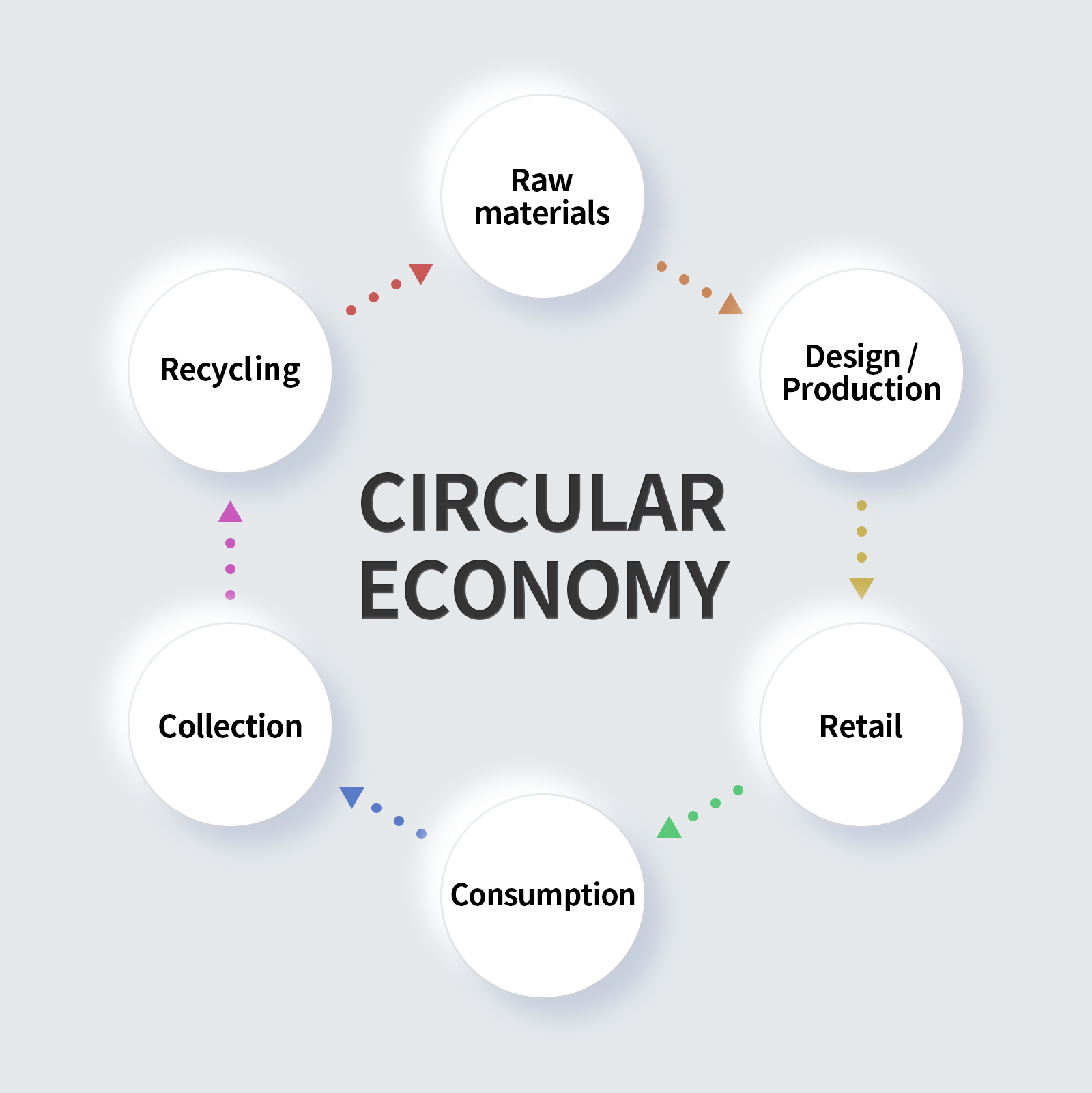The charm of circular economy captivated the world, turning waste into treasure
2023.03.19
Abnormal weather conditions that hit the world last summer are a cause for concern. The United Kingdom, known for its cool summer, suffered heat waves as high as 40 degrees in Celsius, so much so that its schools had to close. Greenland lost 18 billion tons of ice in just over three days. The US suffered the most severe heat wave in 90 years, where 28 states out the 50 went around with excessive heat warnings. With these widespread abnormal weather conditions, awareness of the environment has been raised. As such, attention to a circular economy about protecting the environment against climate change has grown accordingly.
The circular economy is a must for carbon neutrality
The circular economy is a model adopted by Europe designed to avoid the existing linear model where raw materials are mined for production and used products are thrown away after use. In a circular economy, we reuse the used raw materials in every possible way. A successful transition into this renewable energy-based economy is the key to achieving carbon neutrality. Production and disposal of product waste are responsible for 45% of greenhouse gas emissions. In a circular economy, we should be able to cut greenhouse gas emissions significantly and thus able to achieve net zero.

We have a long way to go. According to the OECD, out of the 15% of plastic waste collected for recycling, only 9% was recycled in 2019. Half of the plastic waste ended up in landfills, nearly 1/5 incinerated. We desperately need an economic model that enables upcycling.
Global efforts to build a circular economy
We are witnessing international efforts being placed forth for a circular economy. The EU announced the New Circular Economy Action Plan in March 2020, making all plastic packaging recyclable or reusable. The Fifth session of the United Nations Environment Assembly (UNEA-5) also agreed to develop an international agreement on plastic pollution prevention by 2024. Korea is no exception: It is pursuing legislation requiring over 30% of PET bottles to be made of recycled materials by 2030 under the K-Circular Economy Implementation Plan for Net Zero, announced in December last year. Biden administration has pledged to succeed President Obama’s renewable energy and energy efficiency policy and promoted the Green New Deal alongside implementation plans for a carbon tax and Carbon Border Adjustment Mechanism. The US is now back to the Paris Agreement as of January 20th, 2021, and is set to achieve net zero across the whole economy by 2050 with its Clean Energy and Infrastructure Plan.
Multinational companies are also playing their role, and here are some of the examples of those corporates that are pursuing a circular economy as well as environmental protection. The American recycling company TerraCycle introduced LOOP in 2019, a circular platform built on recyclable packaging materials. LOOP offers normal goods such as shampoo, detergents, toothpaste, and food such as ice cream and chocolate in stainless containers and glass or aluminum bottles. Customers returned the containers after they consumed the products for recycling, similar to milk delivery services when used milk bottles were collected and returned for reuse. The platform, designed to reduce plastic container waste, is currently available in the US, Canada, and the UK.
In France, known as smoker’s haven, a start-up, Cy-Clope, has launched a cigarette butt recycling service based on circular economy. A single cigarette butt can pollute 500 liters of water, taking as long as 12 years to decompose. The French start-up collects cigarette butts from the streets and recycles them, and its collecting container can hold up to 10,000 cigarette butts, eventually recycling 100%. Cigarette filters are recycled as plastic materials, while the rest are used for compost.
Hyosung, a leader in circular economy with its post-consumer PET bottle-based fiber ‘regen®’

A company has been there at least a decade earlier than TerraCycle and Cy-Clope. Hyosung TNC, a chemical fiber affiliate of Hyosung Group, introduced the first Korean recycled polyester fiber regen® in 2008. The yarn is created from post-consumer PET bottles, not existing petrochemical materials.
50 plastic bottles of 500ml are used for one kilogram of regen. As it doesn’t consume petrochemical materials, it also contributes to saving up our limited resources from the earth. International fashion names are using regen® to produce eco-friendly clothing and bags.
Since its inception in 1966, when its mother company Tongyang Nylon was established, Hyosung has led new material development R&D efforts in Korea over the past 60 years. Hyosung regen® has acquired Control Union’s Global Recycle Standard (GRS) certification in 2009 and Eco-Mark from the Japan Environment Association for its contribution to sustainability in the textile industry.
Hyosung’s 100% recycled polyester fiber leading ocean protection
With its dedication to protecting the ocean, a vital buffer against climate change's impacts, Hyosung noted that 80% of ocean waste is plastic. At the same time, 1/3 of them are generated from vessels. Marine debris is collected and disposed of via incineration, creating another layer of environmental degradation. Hyosung’s solution to this problem is ‘regen ocean polyester’ recycled from marine waste.
It has acquired the Ocean Bound Plastic certification, the first of its kind for a Korean company. Ocean-bound plastic is abandoned plastic waste recovered from areas up to 50km inland from waterways or 200meters from rivers and thus often not subject to inland waste or recycling system. Hyosung’s regen ocean polyester is made from PET bottles found in the ocean and waterways, fully meeting the strict standards of the OBP. Thus, Hyosung truly fulfills the spirit of “recycling” by collecting those pollutants from the ocean and ‘recycling’ them. The company has developed a thorough process for the recycling process and specification management for quality control.
Hyosung TNC takes sustainability and circular economy seriously and has made its regen products one of the key growth engines for the company’s future.
World’s first recycled nylon from fishing net waste
Building on its advanced nylon technology, Hyosung TNC has introduced a recycled nylon fiber from ocean waste to contribute to building a new circular economy model. Nearly out of the 8 million tons of plastic waste being dumped into the ocean, 640,000 tons are from fishing net waste. Hyosung’s regen ocean nylon, launched in 2007, is the world’s first recycled nylon fiber made from fishing net waste.
Turning discarded fishing net waste into high-quality yarns is quite challenging because the marine debris, after being soaked in the salty waters, often comes with many impurities and thus making it tricky to extract caprolactam, a key material for nylon yarns. So much so that there are only two companies in the world with their proprietary technology of nylon recycling. Hyosung TNC was the first company to introduce recycled nylon worldwide based on its decades-old technology and R&D efforts.
The company has signed MOUs with Korean local governments such as Busan City and South Jeolla Province in 2021 to expand its regen ocean nylon to increase the capacity to 150 tons per month.
We at Hyosung spare no effort in resource sustainability and environmental protection
Hyosung offers other recycled fibers such as regen® spandex, recycled spandex from reclaimed waste. regen® spandex is the only commercially available recycled spandex that can be applied for various use and is naturally in high demand. It is made with pre-consumer waste from the company’s virgin creora® spandex yarn manufacturing process.
Hyosung’s unparalleled commitment to a circular economy is proven by its decades-long focus on research and technology since the 1960s when it opened its first research center. With its entire portfolio of regen polyester recycled from PET bottles, regen ocean polyester made with PET bottles found in waterways, regen ocean nylon made from fishing net waste, and regen® spandex from reclaimed textile waste, Hyosung continues its commitment to sustainability and environmental protection for the sake of a better life for humanity.